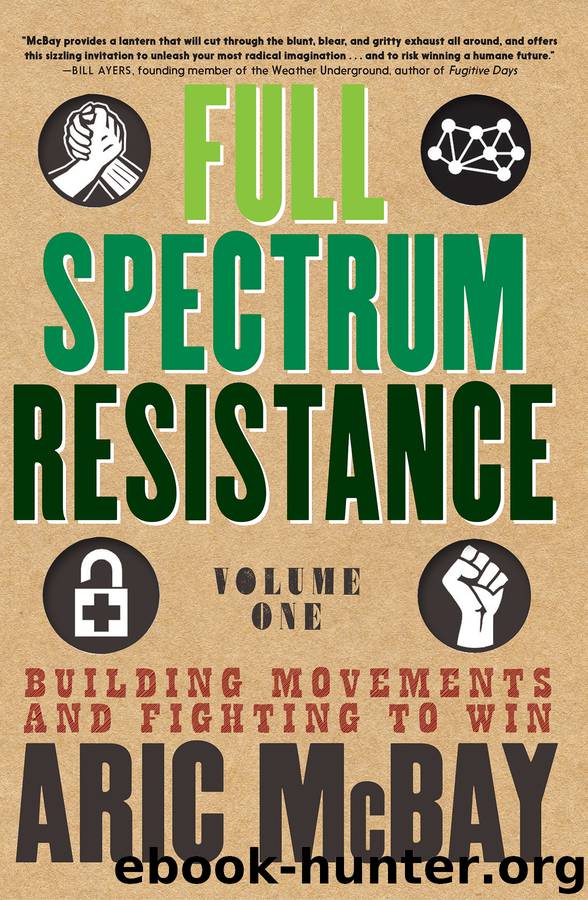Full Spectrum Resistance, Volume One by Aric McBay

Author:Aric McBay
Language: eng
Format: epub
Tags: diversity of tactics, intersectionality, social movements, movement building, how to protest, social justice, racial justice, civil rights, history of political movements, history of activism, activist movements, protest movements, climate activism, green activism, communist handbook, socialist handbook, anarchist handbook, socialism, anarchism, activist handbook, books about protest, activist history, history of protest, feminism, gay rights, lgbt rights, climate change, protest, resistance, activism
ISBN: 9781609809126
Publisher: Seven Stories Press
Published: 2019-04-22T18:00:00+00:00
Demobilization and Movement Departure
What happens when people leave a movement? Bert Klandermans examined this question in a study of the Dutch anti–cruise missile movement. In the mid-1980s a nonviolent movement lobbied against NATO cruise missile deployment in the Netherlands.
A primary effort in the movement was to create a petition to the government. Activists collected a genuinely impressive number of signatures, but were nonetheless ignored by those in power.
Klandermans writes that “the total disregard of the outcome by the government was a major blow to many of them, although paradoxically very few had expected a different outcome.” Many activists expected a subsequent election would punish the ruling parties—the Christian Democrats and Conservatives—but that didn’t happen. In fact, the main peace organization refused to campaign against those parties in fear of alienating churches.
“Two blows in a row forced many activists to reconsider their participation in the peace movement,” explains Klandermans. “Some of those who left were burned out, had lost their faith or felt estranged from the other people in the movement. Others radicalized when the movement refused to adopt more militant strategies. Again others shifted to other movements.”271
Of course, there is always a trickle of people leaving movements for reasons both personal and political. This is not a problem unless the movement is a) unable to recruit people more quickly, or b) unable to adopt tactics that will be effective with the numbers it has. The Dutch peace movement was not able to cope. Klandermans interviewed members of the movement to talk about why they left or stayed (by 1991, 87.5 percent of those interviewed had left the peace movement).272
Klandermans found that members of the peace movement could be divided into three basic groups: persisters, shifters, and terminators.
Persisters, who stayed in the movement, “consisted of activists who were somewhat older, politically less radical, more often active members of church movements. For most of them the peace movement had been the first movement they had joined in their lives.” He explains: “When asked why they remained active in the peace movement they referred predominantly to commitment to the group they were part of and the people in that group.” Persisters lacked experience in social movements, but were highly committed to the peace movement because of their social ties.273
Shifters left the peace movement but continued as activists in other campaigns. Most had been active in other movements before the peace movement, including “the anti–nuclear power movement, the anti–Vietnam War movement, the environmental movement, the student movement, the third world support groups, the women’s movement, and so on. Moreover, shifters had more often participated in more militant protests like blockades and site-occupations. Unlike the terminators, the shifters left the movement because they opted for more militant strategies against the policy of the IKV [the main peace organization].”274
Shifters, though they left the peace movement, were the most radical, committed, and hard-working of the three groups. Klandermans explains: “Shifters spent the most hours a week on the movement, even more than persisters; terminators spent the least. Among shifters being an activist seems to have been a central part of their identity.
Download
This site does not store any files on its server. We only index and link to content provided by other sites. Please contact the content providers to delete copyright contents if any and email us, we'll remove relevant links or contents immediately.
| Anarchism | Communism & Socialism |
| Conservatism & Liberalism | Democracy |
| Fascism | Libertarianism |
| Nationalism | Radicalism |
| Utopian |
The Secret History by Donna Tartt(19010)
The Social Justice Warrior Handbook by Lisa De Pasquale(12179)
Thirteen Reasons Why by Jay Asher(8878)
This Is How You Lose Her by Junot Diaz(6864)
Weapons of Math Destruction by Cathy O'Neil(6252)
Zero to One by Peter Thiel(5773)
Beartown by Fredrik Backman(5720)
The Myth of the Strong Leader by Archie Brown(5484)
The Fire Next Time by James Baldwin(5417)
How Democracies Die by Steven Levitsky & Daniel Ziblatt(5207)
Promise Me, Dad by Joe Biden(5134)
Stone's Rules by Roger Stone(5070)
A Higher Loyalty: Truth, Lies, and Leadership by James Comey(4942)
100 Deadly Skills by Clint Emerson(4902)
Rise and Kill First by Ronen Bergman(4766)
Secrecy World by Jake Bernstein(4733)
The David Icke Guide to the Global Conspiracy (and how to end it) by David Icke(4690)
The Farm by Tom Rob Smith(4492)
The Doomsday Machine by Daniel Ellsberg(4476)
